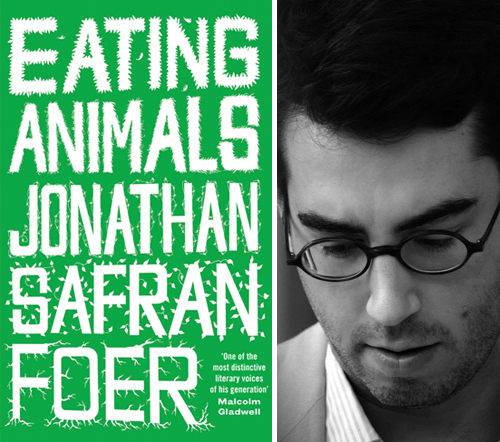When I was a freshman in high school, my friend Andrea bought me Everything is Illuminated for my birthday. I was instantly smitten, and a long love affair with the work of the then very young Jonathan Safran Foer was born. I devoured the entirety of his output, and I have the weird cutout book to prove it.
As I’ve gotten older and the hysterical realism vein of contemporary literature has bled out a little, I’ve come to see his work a bit less romantically and its flaws are more apparent. A tendency toward self-righteousness is inborn in people who are very good at their chosen craft at a tender age, and he’s no exception. It’s for this reason that I put off reading Eating Animals for five years.
I was a vegetarian for five years in my late teens and early twenties, but I was never that enthused about meat before that. A stint in Spain where ham is considered a vegetable and a desire to impress a particularly omnivorous beau cured me of what my mother loved to call “the vegetarianism.” Though I dabble in veganism and am extremely watchful of what I eat, I don’t place much in the way of restrictions on my diet these days.
I ran across this book at the Radcliffe, Kentucky Barnes and Noble on the deep clearance shelf. Radcliffe, for the uninitiated, is the hanger-on town that accompanies Fort Knox. It’s not renowned as a particularly literary place, nor one that would be excited to read a three hundred page treatise by a Northeastern Jewish intellectual on why buying cheap meat is a bad idea. It was four dollars and I decided now was as good a time as any.
JSF, as I have called him since I was a teenager, presents himself as an on again, off again vegetarian. As a new father, he wanted to raise his child (whose name is Sasha, and that’s a thing I know because I just do) ethically and healthfully, and set out on a journey to figure out, once and for all, what the ethical and healthful implications of consuming animal products were. He approached this academically and coolly, something that can not be said for many books about the pros and cons of hamburgers. It doesn’t hurt that his writerly impulses can’t be quelled and the prose is much lovelier than that of Fast Food Nation.
He’s a smart guy, that JSF, and he defines his terms carefully and quantifiably, and he makes no statement that eating meat, eggs, and dairy is in all ways indefensible. Ninety-six percent of Americans, he says, agree that we should give animals we eat a humane death, and more than two-thirds support “strict legislation” concerning their health and welfare. In a country where we can’t decide if you should or should not be able to take birth control pills, it’s pretty unusual for that many people to have that unified a point of view about much of anything. Eating Animals isn’t about should we or shouldn’t we eat meat, but rather is it justifiable for us to eat meat at the volume we do under the current system. Spoiler alert: the answer is no, but you know that. Overall, this is a look at the factory farming/industrial fishing system, and it breaks it down for an urbanite, vegetable farmer, or suburb dweller in ways that are easy to understand but hard to digest.
We all know that Americans eat too much animal protein and that we should all cut back in favor of more fruits and vegetables and whole grains, but this spells it out for you in words you can understand and with examples that make sense. Though I don’t know if everyone who reads it will have a sincere change of heart, I challenge you to read it and not at least consider the implications of your own choices. If you’re a longtime reader of Chronderlust, you know that I’m an emotional sap who feels a lot of feels, and this book made me have a whole trough of them. Ultimately, it’s going to change a lot about the way I eat, and I’m grateful I read it. Whether or not I regress to full-time vegetarianism is still up for debate, but Eating Animals inspired me to eat in a way that is consistent with the ethical and moral life I try really hard to lead.
Okay! Enough of that. Have you read Eating Animals? What did you think? Did you learn something or change your personal habits? Do you have another book about food politics you’d recommend?
Next week, I’ll be reading this. Please join me!
